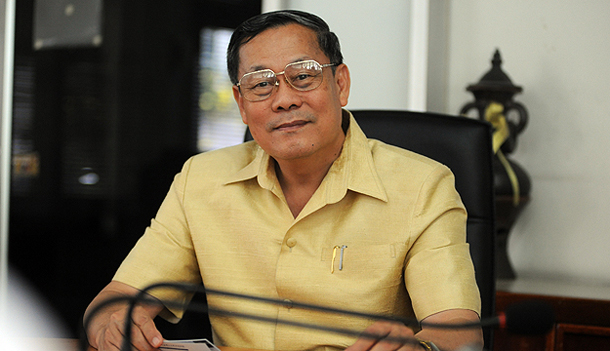A leading Thai university, the Rajamangala University of Technology Lanna (RUMTL), will soon sign a Memorandum of Understand (MoU) with Burma’s Department of Higher Education (Lower Myanmar) with the aim of exchanging educational programs.
In an interview with The Irrawaddy in the northern Thai city of Chiang Mai, RMUTL President Chaiyong Eurviriyanukul said the MoU with Burma was just a first step toward expanding cooperation with the 10 member states of the Association of Southeast Asian Nations (Asean).
The proposed exchange program aims not only to strengthen mutual understanding between Thai and Burmese students, but also between the two countries, said Eurviriyanukul, who visited Burma from July 19-22. He said the move was timed to prepare for the inauguration of the planned Asean Economic Community (AEC) in 2015.
During his trip to Burma, Eurviriyanukul traveled to Naypyidaw to discuss the MoU with Deputy Education Minister Ba Shwe and Zaw Htay, the director general of the Department of Higher Education (Lower Myanmar), which is a departmental body under Burma’s Ministry of Education.
Under the proposed agreement, RMUTL will offer exchange programs is areas such as language and cultural studies. The university will also offer internships and scholarship programs to Burmese students to allow them to study at its six campuses.
“After the student exchange, we will recruit Burmese students to come over to our university to help teach English and Burmese language to our students. We will also send our students to universities in Myanmar to share Thai language. This idea will help to create better connections for both side,” said Eurviriyanukul, who proposed to offer full scholarships for 10 Burmese university students during his trip to Burma.
RMUTL is one of Thailand’s best-known universities and has campuses in six provinces—Chiang Mai, Chiang Rai, Lampang, Nan, Tak and Pitsanulok. It offers practical education that applies scientific and technological concepts to everyday problems.
Eurviriyanukul said he didn’t foresee any obstacles to establishing the new exchange program, which would be similar to ones already set up for Japanese, Chinese and Korean students.
“We are ready to sign the MoU. Education has nothing to do with politics, so we have no problem,” he said.
Dr. Nu Nu Yin, a retired Burmese professor who helped RMUTL to reach the agreement with the Burmese authorities, also sounded optimistic. “We discussed signing the MoU and the situation is quite positive,” she told The Irrawaddy, adding that the agreement could be signed as early as this month.
“After signing the MoU, we will start a language exchange program,” said Nu Nu Yin, who is currently working at RMUTL in the International Business Department. She formerly worked in the Department of Management Studies at the Yangon Institute of Economics.
Apart from its formal educational exchange programs, RMUTL also plans to set up a program to teach the Thai language to Burmese who are already living in Thailand. The aim is to enhance understanding between Thais and Burmese and improve living and working conditions for members of the Burmese community in Thailand, said Eurviriyanukul.
The RMUTL plan is part of larger push within Asean to establish stronger educational ties between member states as they move toward closer integration. As part of its preparation for the establishment of the AEC in 2015, Thailand has stepped up its efforts to improve the language skills of Thai students, in both English and regional languages.
“Under the AEC, we have no border, no gates. It’s an open house,” said Eurviriyanukul.

















